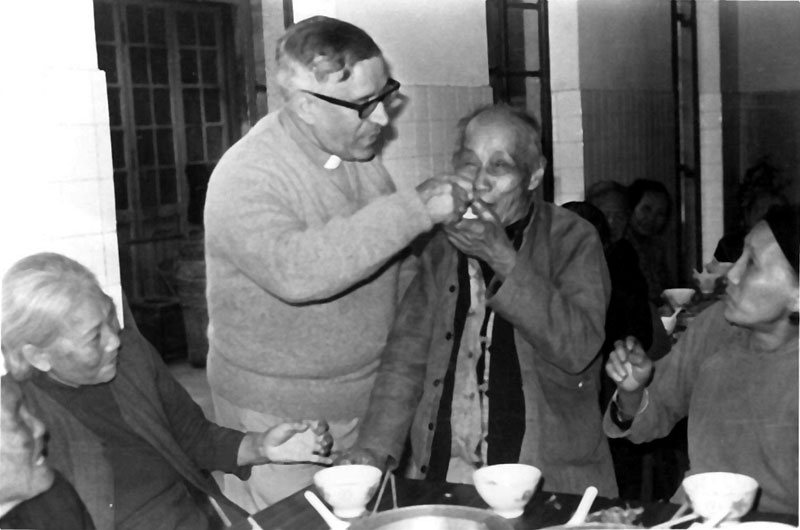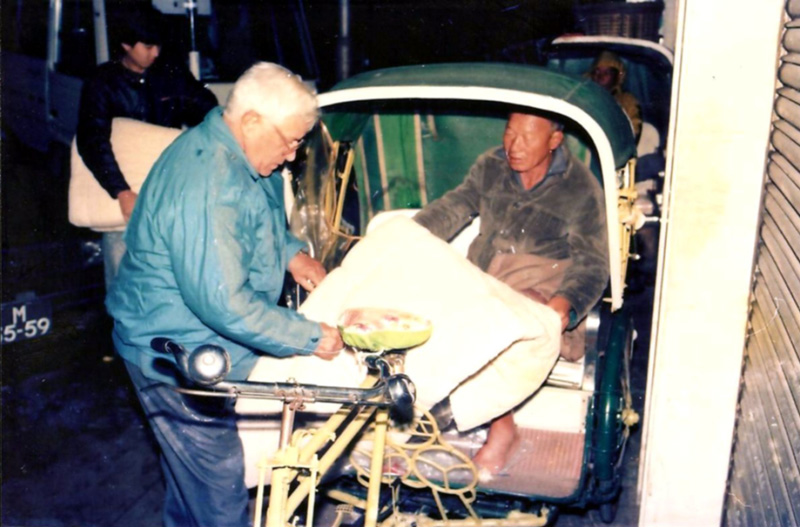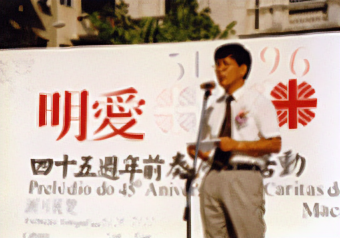
1950s
In the early 1950s, the lives of Macau residents were generally difficult, also, there was an increased trend in migration and refugee waves from neighboring regions. Fr. Luis Ruiz Suarez, who had just arrived in Macau, who upholds the Christian spirit of serving the youngest brother. He had borrowed the Ricci House (now known as Centro para Idosos da Casa Ricci) from the diocese of Macau and started the ‘Casa Ricci Social Services Centre’. At the beginnings, the service target was refugees. In order to let them become self-reliant and live in this new environment with dignity, the center did help them not only to solve urgent food and accommodation problems, but also to apply for certificates to find jobs and schools. The center had also assisted in setting up schools that provided opportunities for the refugees’ children to be educated.
1960s
Refugees in Macau had started to migrate to other places gradually. Father Ruiz then put his concentration on the elderly who were orphaned due to social poverty. Also, he had personally opened the first male and female Home for the Elderly in Macau, including the Asilo Betania and the Asilo de Santa Maria. He had also assisted in rice distribution, economics and cases assistance to the poor elderlies in Zona Norte and Taipa. The social poverty problem had led to child labor issue. Father Ruiz then distributed rice to the poor families to reduce their life burdens, so that their children had had an opportunity to go to school.

1970s
Caritas de Macau is a comprehensive social service organization under the auspices of the Catholic Diocese of Macau, formerly known as "Centro Social Mateus Ricci". Caritas Macau was founded by Fr. Luis Ruiz Suarez, S.J. on 8 December 1951. In 1971, "Centro Social Mateus Ricci" applied for joining Caritas Internationalis, and renamed itself as "'Caritas de Macau” afterward.

1980s
Under the rapid development of Macau in the 1980s, Macau’s residents not only needed to tackle basic living problems but also involved in mental health problems that occur to urban people. At the same time, Caritas had changed the service model due to the participation of social workers. As for the Services for the Elderly, Caritas had taken over the S. Francis Xavier Home for the Aged from the Canossian Daughters of Charity, three elderly centers had been opened in Largo de Santo Agostinho, Ilha Verde and Taipa respectively. Moreover, in the services for the disbaled aspect, Caritas had taken over the Centro De Santa Lucia and Centro De Santa Margarida successively, a special school named ‘Caritas School’ was opened based on the concept of ‘All men are created equal’, Caritas participated directly in educating the mentally disabled children. The diversified services in the 1970s had also continued in the 1980s. During 1970, Caritas also started the development of the Caritas Women Centre, the Brito School, the driving courses for the physically handicapped, and the Suicide Prevention Services Centre. The services’ target is the most neglected and needed people in the society.
1990s
Entering the 1990s, the organizational structure of Caritas de Macau had undergone a significant change. Caritas had established the position of presidium, board of supervisors, executive committee, advisory board and executive secretary, and Father Ruiz as the director and Pun Chi-Ming as the secretary-general. They would like to supervise and implement the mission of ‘for the neediest brothers’ effectively with the most suitable management. In terms of services, all members in the Caritas worked together as a team to meet the demand of the society and develop continuously, including youth services, services for street sleepers, Habitação Social Elderly Home, Day Care Centers, Caritas Kindergarten and Caritas Nursery school and rehabus. With providing the systematic and diversified social services, Caritas upholded the service model, the ‘human development’. Everyone could enjoy development opportunities and become an independent and autonomous individual.
Entering the 21st century
2000~2009
Before the return of Macau, the global economic and financial turmoil had affected Macau. Macau’s economy was in a recession and numerous workers faced employment difficulties and unemployment. In response to the community's demands for job introduction and launching job positions, Caritas de Macau opened the ‘Grupo de Cooperacao Hip Lek’ on 16 June 2020 to provide employment assistance to the unemployed workers. With the transformation of Macau society in a few years later, many middle-aged people faced difficulties in finding jobs. It had affected their livelihoods, so they needed to seek help from the Social Welfare Bureau (IAS). Therefore, Caritas implemented a ‘welfare-to-work program’ from May 2004 to March 2006. In April 2006, IAS cooperated with Caritas de Macau to transform the above plan into a ‘Community Employment Assistance Program’. At the same time, the IAS launched the ‘Positive Life Service Program’ to further assist participants in re-employment. During 2003, Macau’s economy was seriously affected by SARS. Caritas continued to play the role of helping the poor and disadvantaged.
In order to cultivate teenagers with the correct value and thought through performing arts effectively, Clementina Leitao Ho Teatro Brito was opened on May 26, 2005. By nurturing teenagers’ cultural accomplishment, they could develop a sense of belonging to Macau.
In March 2007, Lar de Cuidados “Sol Nascente” de Areia Preta formally started their services. Their service tenet is to provide high-quality and comprehensive accommodation and health care services to those who are weak and physically impaired and require highly care. These services help them to maintain health standards within a possible range, delay the degenerative process and enjoy a comfortable and dignified life.
The new location of Centro de Santa Margarida, R. De Tin Chon in Taipa, was officially set up in 2009 which aims to improve the residential life of the disabled. The Center did not only increase the number of residential places to fulfill the social needs, but also improve the living environment for the users. With the extension of the service contents, it has increased the quality of the rehabilitation training and raised the life quality of the service users.
Furthermore, in order to cooperate with the need of social development, Cáritas de Macau established a social enterprise Viagens Acessíveis which started to operate in March 2009. Its purpose is to enhance the communication and collaboration of the disabled in Hong Kong and Macau, also, to provide pick-up services for passengers who have difficulties in moving, especially those using wheelchairs.

2010~2019
To commemorate Sr. Maria Goisis and continue to uphold the spirit of motivating social services, Caritas de Macau established the ‘Mother Mary Social Studies Center’ in November 2010. The Center enhanced the research of social work and science investigation in Macau by exploring different investigation areas, evaluating and analyzing the social development trend; with combining the social research and social work practices to further promote the localized development of social work specialty.
On September 8, 2011, Fernando Chui Sai On, Ph.D., the Chief Executive of Macau SAR, hosted the opening ceremony of Brilho de Vida. The center is located in Habitação Social do Fai Chi Kei. It provides various cultural and recreational activities to enrich the elderly lives, also it enhances and facilitates the ability of self-occupied elderly to live independently, delay and improve the rate of degeneration. The center provides personal care services, household assistance, and 24-hour emergency support especially for the elderly and the infirm so that they can enjoy their twilight years in the comfortable community gladly and in dignity.
‘Centro do Servico de Fornecimento Temporário de Alimentos de Caritas’ - The Short-term Food Assistance Service was formally undertaken by Caritas de Macau and put into service in September 2011. The service is an intervention channel for Caritas to contact people who face financial difficulties, and to conduct further assessments and follow-up services to reduce the outbreak of other potential problems. In the long term, the Center hoped that the service with the help of social power, can raise people’s concerns and improve the poverty problem in society.
Due to the aging population problem and the constant increase in the number of people who need highly caring services in Macau, Caritas de Macau received sponsorship from the Fundacao Macau Foundation. And started the project ‘Macau Foundation - Caritas Home Care Services’ in December 2012. Home Care Services was launched in the form of a ‘pilot program’, and brought caring services to society under the concept of “household hospital beds”. This service emphasizes on having a speedy and promptly response so that the discharged patients who have highly caring needs can enjoy proper care from the professionals. Moreover, the service provides a 24-hour healthcare support, which is not restricted by time, so the caregivers can enjoy some personal time and get some rest.
‘Good Fortune Charity Shop’, formerly known as ‘Caritas Charity Bazaar’, began its trial run in 2011. It was officially established as the social enterprise ‘Good Fortune Charity Shop’ in January 2013. The operation of the shop is mainly through the collection of new or second-hand items that are transplanted by enterprises or benefactors for charity sale. The donation from the charity sale will serve for charity services, meanwhile, supporting environmental protection, cherishing all resources and protecting the Earth.
Since June 2013, "24-Hour Emergency Support Service-Helpline", which operates all year round, has been hosted as entrusted by the IAS. By combining the power of the government and the society, the hotline center responds flexibly and closely to the needs of service audiences and provides immediate emergency services for individuals or families in need.
In response to changes in Macau ’s transportation system, Viagens Acessíveis has launched a point-to-point pick-up service called “Good Take Express” since November 2014. The service aims to create equal travel conditions for the needs of Macau residents with limited mobility, encouraging more participation in social activities.
On 25th November 2016, Tam Chon Weng Alexis, the secretariat for Social Affairs and Culture, hosted the opening of the "Tsuen Yan Lok Integrated Family Service Centre" and "Hoi Fai Life Education and Resources Center". The establishment of the "Tsuen Yan Lok Integrated Family Service Centre" marked the further strengthening connection of the family in Macau and community service. The center provides preventive, supportive and curative services, which support individuals and families in an integrated service model, and promote family and community harmony. The establishment of the "Hoi Fai Life Education and Resources Center" marked Macau SAR is highly concerned about the mental health issues and suicide prevention. The center mainly provides residents with comprehensive services for suicide prevention and community resource information, and to promote the meaning of cherishing and loving life.
On 9th November 2017, Everbright Elderly Integrated Service Centre was inaugurated by Chui Sai On, the Chief Executive of the Macau SAR. The center is located on the seventh to ninth floors of the Edifício de Serviços Sociais de Saúde de Seac Pai Van. It is a four-in-one elderly services complex including residential accommodation, daycare, home care and support, and carer services.
The "Creche-Vamos a Brincar" was opened in July 2018. The service targets are infants and toddlers who are three months to three years old. In order to support infants and children with mild special needs in the society, the nursery school provides inclusive childcare services. Through providing daycare and growth support services for the needed infants and children who meet the requirements of using general child care services, they can grow up in a safe, inspiring and inclusive environment.
In January 2019, the "Macau Foundation - Caritas Home Care Services" was included in Macau SAR’s social service work system. IAS continued to fund the development of the center and renamed it as "Caritas Home Care Service".
In January 2019, Cáritas de Macau was funded by the Fundação Macau to implement the “Macau Foundation - Caritas Transit-aided Service for PwDs”. It mainly provides staircase services for the elderly and the disabled who have lived in tenement buildings for years and are physically fit to go out, the service encourages them to participate more in social activities.
Caritas de Macau has served the society for 65 years until now. All fellow workers and volunteers have been working hard on the same track, pursuing the spirit of benevolence, caring for the weak, helping those in need out of difficulties and rebuilding a new life. Currently, Caritas de Macau’s service categories have covered elderly care, family, infant, youth, education, rehabilitation, hotline counseling, social reintegration, street sleepers, labor, cultural promotion, social enterprises and sponsor children. It also covers a wider range of services for the elderly, young children, women, people with disabilities and foreign laborers. Caritas de Macau, as an organization with experienced service milestones and commitments, would like to continue to gather powers from all parties to jointly explore difficulties and situations faced by the public in today's society and to promote how to be more active in providing service, so as to achieve the spirit of people-oriented services.
